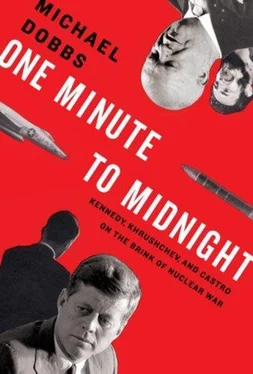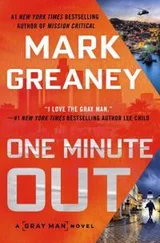After finishing the letter to Kennedy, Khrushchev dictated a message to Fidel Castro. Dealing with the prickly Cuban leader was difficult enough at the best of times. The rush to announce an agreement with Washington complicated matters even more. By the time the coded cable reached Havana, the whole world would already know about the “crate and return” order from Radio Moscow. Anticipating an explosion, Khrushchev pleaded with Castro “not to be carried away by sentiment.” He acknowledged that the Americans had acted rashly in sending their reconnaissance planes over Cuban territory. “Yesterday you shot down one of them,” he complained, as if Castro was personally responsible for the decision. “Earlier you didn’t shoot them down when they overflew your territory.”
Khrushchev advised Castro to “show patience, self-control, and still more self-control.” If the Americans invaded, Cubans had every right to defend themselves “by all means.” But Castro should not allow himself to be “carried away by the provocations” of “Pentagon militarists” who were looking for any excuse to invade Cuba.
There was one more message to send, to General Pliyev, the commander of the Soviet Group of Forces on Cuba. It was succinct and to the point:
We consider that you acted too hastily in shooting down the American U-2 spy plane, at a time when an agreement was already emerging to avert an attack on Cuba by peaceful means.
We have taken a decision to dismantle the R-12 missiles and evacuate them. Begin to implement this measure.
Confirm receipt.
At Khrushchev’s behest, Pliyev’s men had labored day and night to prepare the missiles for firing, and target them on American cities. Now, at the very moment they had completed their assignment, they were being told to disassemble everything. No explanation for this stunning turnaround was provided.
4:30 A.M. SUNDAY, OCTOBER 28
The American destroyers had been trailing the Grozny all night. Standing on the bridges of the Lawrence and the MacDonough, U.S. naval officers could see the lights of the Soviet merchant vessel as she headed toward the quarantine line. They discussed how they would board the tanker and inspect her cargo, if ordered to make an interception.
The Navy was rethinking how to halt Soviet ships that refused to stop for inspection. “Firing a shot across the bow should be avoided if possible,” read the latest message from the headquarters of the Atlantic Fleet in Norfolk. “If this situation arises, a scheme has been devised to bring such ships to a stop.” The new procedure consisted of entangling the target ship in “a long wire” or rope. Exactly how this would work was unclear. Further details were promised later.
As they waited for dawn, the Americans noticed that the Soviet ship had come to a standstill just outside the quarantine zone. A flash telegram was dispatched to Norfolk: “Contact dead in water since 0430.”
The Grozny had received instructions not to challenge the blockade.
6:30 A.M. SUNDAY, OCTOBER 28
Three hundred miles further north, American destroyers were still surrounding submarine B-59. The Soviet crew had painted out the number on the conning tower, but the ship was flying the red flag. Attempts by American warships to communicate with the sub by flashing light had been hampered by the language barrier and peculiarities in the Russian Morse code alphabet. American signalmen had interpreted the name of the Soviet submarine variously as “ Korabl X” or “ Ship X,” and “ Prinavlyet” and “ Prosnablavst,” two items of meaningless gibberish.
As dawn broke, American commanders decided to make another attempt to contact the sub. A pair of Russian-language speakers were dispatched by helicopter from the Randolph to the Lowry. The destroyer came alongside the submarine, within hailing distance by megaphone.
“Vnimaniye, vnimaniye,” Captain Oscar MacMillan shouted into the microphone from the bridge of the Lowry. “Attention, attention.”
“ Kak vas zovut ? What is your name?”
A couple of Soviet sailors were on the bridge of B-59. They ignored the shouted greetings from the Americans. Their faces betrayed no emotion, or any sign of recognition.
The second American interpreter, Lieutenant Commander George Bird, tried to speak louder. “Attention, attention please,” he yelled several times. “What is the name of your ship? Where are you going?”
Still no reply.
The captain of the Lowry tried a new approach. He assembled the destroyer’s jazz band on deck, and told them to play some music. Strains of Yankee Doodle floated across the ocean, followed by a boogie-woogie number. The Americans thought they could see a smile on the face of one of the sailors. They asked if there was any particular tune he would like to hear. The Soviet sailor did not respond.
The Americans on board the Lowry were dancing in tune to the music, and ostentatiously enjoying themselves. They threw some packets of cigarettes and Coca-Cola cans at the Soviet submarine, but the packages fell into the water. The B-59 skipper, Savitsky, told his men to “behave with dignity.” The Russians photographed the Americans and the Americans photographed the Russians. When Savitsky spotted one of his men on the bridge discreetly tapping his foot in time with the jazz band, he ordered the sailor below deck.
It was a relief to know that World War III had not broken out. Even so, there would be no fraternizing with the Americans.
B-59 managed to break away from its pursuers after two days of continuous surveillance. Savitsky waited until his batteries were recharged, took his vessel down to five hundred feet, switched course by 180 degrees, and made his escape. Shortly afterward, the USS Charles P. Cecil was able to force another Soviet submarine, B-36, to the surface. A third Foxtrot, B-130, had to be towed back to the Kola Peninsula by tugboat after failing to repair its broken diesel engines. Only one submarine, B-4, under Captain Ryurik Ketov, managed to complete its mission without the humiliation of having to surface in front of American warships.
The submarine commanders returned to Murmansk at the end of December to a frigid reception from their superiors. No allowances were made for the technical shortcomings of the Soviet vessels or the superiority of U.S. naval forces. As usual, the failure of the mission was blamed on the men who had risked their lives to implement it rather than the admirals and apparatchiks who made a mess of the planning. The deputy minister of defense, Marshal Andrei Grechko, refused to listen to the skippers when they tried to describe the difficulties they had encountered. At one point, he became so angry that he removed his glasses and smashed them against the conference table. They promptly broke into small fragments.
Grechko seemed unable to understand that a submarine had to come to the surface in order to recharge its batteries. “The only thing he understood was that we violated the secrecy requirements, were discovered by the Americans, and that for some time we stayed in close contact with them,” recalled Aleksei Dubivko, the commander of B-36.
“It’s a disgrace,” the marshal fumed. “You have shamed Russia.”
The moment had arrived that Chuck Maultsby had been dreading ever since his safe return to Alaska. General Power wanted to see him. The SAC commander had a reputation for being a harsh taskmaster, intolerant of the slightest mistake. His associates believed he derived a perverse pleasure from stripping subordinates down in public. A top deputy would later recall that Power “enjoyed ridiculing people and heckling people, and he was an expert at it. He delighted in getting a group in his office for a briefing and then making an ass out of the briefing officer.” If a wing commander was summoned to brief the general about an accident, “nine times out of ten he was going to go home fired.”
Читать дальше












